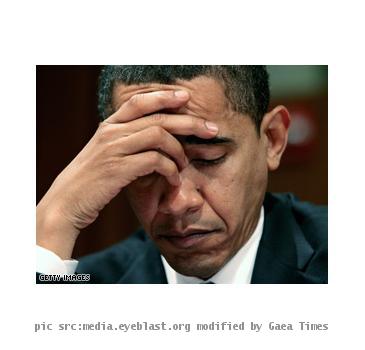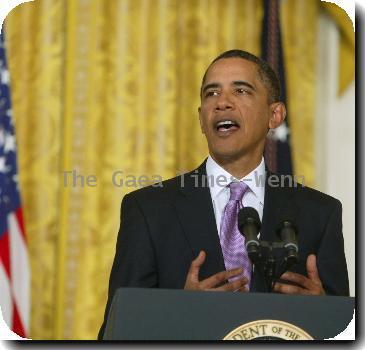Combative Obama insists on ending Bush-era tax cuts for nation’s wealthiest; would keep others
By Tom Raum, APWednesday, September 8, 2010
Obama firm: won’t yield on tax hike for wealthiest
CLEVELAND — Politically weakened but refusing to bend, President Barack Obama insisted Wednesday that Bush-era tax cuts be cut off for the wealthiest Americans, joining battle with Republicans — and some fellow Democrats — just two months before bruising midterm elections.
Singling out House GOP leader John Boehner in his home state, Obama delivered a searing attack on Republicans for advocating “the same philosophy that led to this mess in the first place: cut more taxes for millionaires and cut more rules for corporations.”
Obama rolled out a trio of new plans to help spur job growth and invigorate the sluggish national economic recovery. They would expand and permanently extend a research and development tax credit that lapsed in 2009, allow businesses to write off 100 percent of their investments in equipment and plants through 2011 and pump $50 billion into highway, rail, airport and other infrastructure projects.
The package was assembled by the president’s economic team after it became clear that the recovery was running out of steam. There was a political component, too: With Democrats in danger of losing control of the House in November, Obama is under heavy pressure to show voters that he and his party are ready to do more to get the economy moving and get millions of jobless Americans back to work.
However, none of Wednesday’s proposals, nor Obama’s call for allowing tax rates to rise for the wealthiest Americans, seems likely to be acted on by Congress before the elections, reflecting the battering Obama and congressional Democrats have taken in public opinion polls.
Obama made one of his strongest appeals yet to allow the tax cuts passed under President George W. Bush — in 2001 and 2003 — to expire at the end of the year on schedule, but just for individuals earning more than $200,000 annually or joint filers earning over $250,000. The changes would affect dividend and capital gains rates and various other tax benefits as well as income from wages and salaries.
The president’s strategy — pushing for legislation to save some tax cuts but not all — carries its own risks. Since all the tax breaks would expire automatically at the end of the year if Congress failed to act, that could result in sweeping increases for taxpayers at every income level — a major blow to recovery hopes and a colossal dose of blame for voters to parcel out to lawmakers and the White House.
Some influential Democrats, and Obama’s own former budget director, Peter Orszag, have suggested a compromise might be necessary — one to temporarily extend all the tax cuts, perhaps for a year or two — given the current election-year animosity between the two parties.
But in his remarks in Cleveland, Obama strongly signaled he wasn’t about to sign off on any such deal.
“Let me be clear to Mr. Boehner and everyone else. We should not hold middle class tax cuts hostage any longer,” the president said. The administration “is ready this week to give tax cuts to every American making $250,000 or less,” he said. It was a slight misstatement of his own position, since the $250,000 would apply to household income. The threshold for individuals would be $200,000
White House officials said Cleveland was picked as the speech site expressly because Boehner, who probably would become House speaker if Republicans take back control of the chamber in November, laid out his party’s economic agenda here in a fiery Aug. 24 speech.
At that time, the Ohio Republican called for Obama to fire key economic advisers and to support an extension of all the Bush tax cuts.
Boehner kept up the attack on Wednesday. “If the president is really serious about focusing on jobs, a good start would be taking the advice of his recently departed budget director and freezing all tax rates, coupled with cutting of federal spending to where it was before all the bailouts, government takeovers and ’stimulus’ spending sprees,” he said after Obama spoke.
Earlier, Boehner was even more specific on ABC’s “Good Morning America,” saying Congress should freeze all tax rates for two years and pare back federal spending to 2008 levels. The deep recession began in December 2007.
White House press secretary Robert Gibbs noted that keeping the Bush tax cuts in effect just for two more years would represent a change from past calls by Boehner to keep them in place permanently.
“My question for him is: Are they abandoning the permanent or are they going with the two-year plan? I’ve seen him saying permanent so many times that I tend to believe that,” Gibbs told reporters aboard Air Force One. “That’s his plan and I think that continues to be his plan.”
Republicans, and some Democrats, argue that the fragile state of the economy makes this a poor time to raise taxes on anyone — and that increases could stifle wealthier people’s appetite for spending.
Obama argued that the rich are more likely to save additional money than spend it. And he said the struggling U.S. economy can’t afford to spend $700 billion to keep lower tax rates in place for the nation’s highest earners.
That $700 billion is what the nonpartisan congressional Joint Committee on Taxation estimates it would cost the Treasury to continue tax cuts for top earners over 10 years. What Obama wants to do would cost just over $3 trillion over the same period, the panel estimates.
The debate over the Bush tax cuts is an unwelcome one for dozens of vulnerable Democratic incumbents just weeks before Election Day. Already, a handful of Democrats in conservative or swing districts, such as Reps. Gerry Connolly in the northern Virginia suburbs of Washington, D.C., and Bobby Bright in southeastern Alabama, have come out publicly for extending all the cuts — at least temporarily.
Sen. Michael Bennet, D-Colo., engaged in a tight re-election battle, said he “would not support additional spending in a second stimulus package” and that any new initiatives such as Obama’s infrastructure package should be paid for with leftover funds in the $814 billion stimulus package passed last year.
Still other embattled Democrats, wary of alienating middle-class voters, are siding with Obama. In central Ohio, for example, Rep. Mary Jo Kilroy has said the tax cuts for higher earners should be repealed but middle-income people should see no tax increases.
Obama acknowledged recovery had slowed noticeably, with unemployment hovering just under 10 percent.
“The middle class is still treading water, while those aspiring to reach the middle class are doing everything they can to keep from drowning,” he said.
Polls have shown a steady slippage in Obama’s approval ratings and an accompanying rise in Republican prospects for winning House and Senate seats in November. That has chipped away at Obama’s leverage to get things done in Congress.
Obama has sought to frame the election as a choice between continuing his policies or reinstating those pursued by Bush. He acknowledged in an interview with ABC after his speech that “if the election is a referendum on are people satisfied about the economy as it currently is, then we’re not going to do well, because I think everybody feels like this economy needs to better than it’s been doing.”
The excerpt was aired Wednesday on ABC’s evening news. Fuller portions of the interview were airing Thursday morning on “Good Morning America.”
Tom Raum reported from Washington. Associated Press writers Stephen Ohlemacher and Erica Werner in Washington contributed to this report.
Tags: Arts And Entertainment, Barack Obama, Cleveland, District Of Columbia, North America, Ohio, Political Organizations, Political Parties, Recessions And Depressions, Television Programs, Tv News, United States, Us-obama







